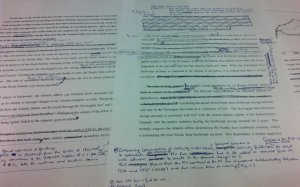How can we scaffold laboratories in a way that doesn’t micromanage the students, keeps the task interesting, and helps the students to make sense of what they are doing and seeing? A really interesting way to structure this through writing is the Decision/Explanation/Observation/Inference method by Van Duzor (2016).
Tag Archives: writing
Giving feedback on student writing
When feedback is more confusing than helpful.
The other day I came across a blog post on Teaching & Learning in Higher Ed. on responding to student writing/writers by P. T. Corrigan. And one point of that post struck home, and that point is on contradictory teacher feedback.
When I am asked to provide feedback on my peers’ writing, I always ask them about what stage in the writing process they are in and what kind of feedback do they want. Are they in the copy-editing stage and want me to check for spelling and commas, or is this a first draft and they are still open for input on the way their thoughts are organized, or even on the arguments they are making? If a thesis is to be printed that same evening, I am not going to suggest major restructuring of the document. If we are talking about a first draft, I might mark a typo that catches my eye, but I won’t focus on finding every single typo in the document.

But when we give feedback to students, we often give them all the different kinds of feedback at once, leaving them to sort through the feedback and likely sending contradictory messages in the process. Marking all the tiny details that could, and maybe should, be modified suggests that changes to the text are on a polishing level. When we suggest a completely different structure at the same time, chances are that rather than re-writing, students will just move existing blocks of text, assuming that since we provided feedback on a typo-level, those blocks of text are in their final, polished form already when that might not be how we perceive the text.
Thinking about this now, I realize that the feedback I give on student writing does not only need to be tailored to the specific purpose much better, it also needs to come with more meta information about what aspect of the writing my focus is on at that point in time. Only giving feedback on the structure without pointing out grammatical mistakes only sends the right message when it is made clear that the focus, right now, is only on the structure of the document. Similarly, students need to understand that copy-editing will usually not improve the bigger framing of the document and only focus on layout and typo-type corrections.
We’ve intuitively been doing a lot of this pretty well already. But go read Corrigan’s blog post and the literature he links to – it’s certainly worth a read!